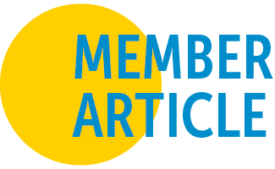
Creating Responsive Educational Avenues for Training Environments in Early Childhood (CREATE EC)

Abstract
Creating Responsive Educational Avenues for Training Environments in Early Childhood (CREATE EC) is a new, interdisciplinary initiative aimed at transforming academic programs and professional development at the University of New Mexico’s College of Education and Human Sciences. The goal is to co-create a community-informed approach for early childhood education with partners from New Mexico’s small towns, rural, Native American, Spanish-speaking, and underrepresented communities. The authors, a team of CREATE EC’s Leadership Academy members, tell the story of CREATE EC by sharing big ideas, some lessons learned, and what the work can mean for the future.
Creating Responsive Educational Avenues for Training Environments in Early Childhood (CREATE EC), a forwardlooking initiative at the University of New Mexico’s College of Education and Human Sciences (COEHS), engaged members of our state’s diverse cultures and communities, where lived experience became the foundation for addressing early childhood workforce needs. COEHS faculty and Family Development Program (FDP) staff were joined by a powerful group of community practitioners representing six of New Mexico’s early childhood community coalitions for a 2-year Leadership Academy. The authors of this article represent important, interdependent circles of our larger CREATE EC Network (see Figure 1). Participants sought to align understanding of the needs of families and young children through relational leadership, collaboration, reflection, and co-learning.
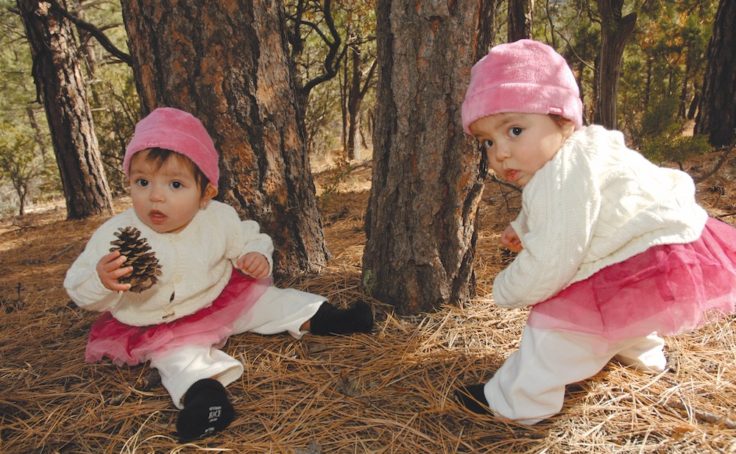
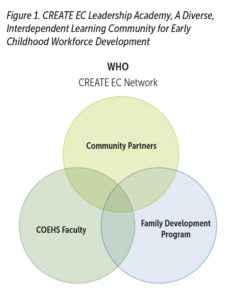 To tell the story of CREATE EC, four authors of our larger initiative came together who could represent community partners, COEHS faculty, and FDP staff. Krystal Chavarria-Gonzàlez and RJ Martinez are from Gadsden in southern New Mexico and Santa Clara Pueblo in the northern part of the state. They represent the diverse group of early childhood practitioners who served as key advisors. Cathy Huaqing Qi is part of the multidisciplinary college faculty and scholars with different expertise who joined the initiative. CREATE EC faculty were committed to co-designing new professional development opportunities and courses that would be developed as a distributed early childhood minor in the college after academic review. Lois Vermilya as the lead author is one of the three principal investigators (PIs) who designed and cofacilitated the project. Lois heads up FDP, which is an outreach center in the college that provides statewide professional development for early education coalitions and professionals. FDP has long-standing relationships with communities across New Mexico and invited a distinguished group of community partners to join the Leadership Academy.
To tell the story of CREATE EC, four authors of our larger initiative came together who could represent community partners, COEHS faculty, and FDP staff. Krystal Chavarria-Gonzàlez and RJ Martinez are from Gadsden in southern New Mexico and Santa Clara Pueblo in the northern part of the state. They represent the diverse group of early childhood practitioners who served as key advisors. Cathy Huaqing Qi is part of the multidisciplinary college faculty and scholars with different expertise who joined the initiative. CREATE EC faculty were committed to co-designing new professional development opportunities and courses that would be developed as a distributed early childhood minor in the college after academic review. Lois Vermilya as the lead author is one of the three principal investigators (PIs) who designed and cofacilitated the project. Lois heads up FDP, which is an outreach center in the college that provides statewide professional development for early education coalitions and professionals. FDP has long-standing relationships with communities across New Mexico and invited a distinguished group of community partners to join the Leadership Academy.
What are the Big Ideas of CREATE EC?
CREATE EC grounded its work in relationships that continuously asked: who am I, what is worth learning, how can we learn this together? Careful attention was given to relational learning practice aimed at strengthening collaboration for true partnership.
Leading Through Community and Relationships
CREATE EC engaged 42 professionals over a 2-year period to discover new ways to transform early childhood education that was relevant for New Mexico’s workforce development because it was rooted in community needs and informed by actual practice on the ground. CREATE EC’s Network members met monthly as a virtual learning community for continuous conversation and collaborative planning. The 2-year initiative also included four in-person 3-day retreats. Collectively, we hold dear to our heart the age-old adage that “It takes a village to raise a child,” which characterizes the ecosystem of our CREATE EC Leadership Academy. Academy members actively participated in a learning community that included:
- 19 professionals from six statewide New Mexico Early
- Childhood Coalitions serving their county and/or region (see Figure 2);
- nine COEHS faculty from several programs that included the Family and Child Studies Program; Nutrition; Counselor Education of the Department of Individual, Family and Community Education; the Department of Special Education; and the Dean’s Office;
- eight FDP staff who served as liaisons between the community partners and faculty;
- three Learning Partners that included a relational leadership consultant and two evaluation team members; and
- three graduate assistants who supported each of the PIs and participated as members of the Leadership Academy.
Becoming a Flourishing Network
The CREATE EC Network was facilitated as a dynamic learning community of practice where all voices were valued and considered equal in power, choosing to break away from job titles, educational degrees, and status. George Otero, founder and executive director of the Center for RelationaLeadership & RelationaLearning was engaged as a consultant to ground the work in relationships. His international experience and relational leadership frameworks combined with FDP’s unique approach to collaborative leadership development became cornerstones for the Leadership Academy’s evolution.
The overarching goal of CREATE EC was to have a group of committed people work collaboratively to improve early childhood well-being as essential for New Mexico’s quality of life. The CREATE EC Network sought to discover new understanding led by the experience of community early childhood leaders combined with the expertise of COEHS faculty and FDP staff. The Leadership Academy addressed state priorities for early childhood workforce development and integrated reflective practice that built upon each person’s strengths. We continuously returned to thoughtful conversations that explored culturally responsive practice and equity as underpinnings for all professional development and academic curricula design. We valued the diverse identities of all members of the Leadership Academy, making time to hear each other’s stories and learning from each other as an ongoing foundation for getting the work done. There was a creative tension articulated as both “Being and Doing” where genuine appreciation for being with each other became the rhythm of why we attended our monthly meetings and four retreats despite all the demands on our time.

Holding the Baby Guiding Framework
The image of Holding the Baby (see Figure 3) centered us in the learning process and illustrated the guiding framework of the Leadership Academy. The Baby reminded us to stay dedicated in our work toward improving the precious quality of life that truly starts at the beginning: the welcome of an infant who is loved and nurtured by his or her family. Holding the Baby conveyed the dedication to a world of relationships that include family, community, culture, and language. Every convening and retreat gave time to exploratory conversations guided by an approach that integrated relational leadership and collaborative practice to intentionally build trust and shared ownership of our work. Holding the Baby challenged us to keep early childhood education grounded in the earliest years. Reminders that we were Holding the Baby ensured that we were thinking about infancy and toddlerhood, not falling into the common misconception of education being defined as pre-K through schooling. It stretched us to consider the legacy of this work: who are we really doing it for? As such, Holding the Baby allowed us to stay connected to what we yearn for as well-being and quality of life for New Mexico’s families.
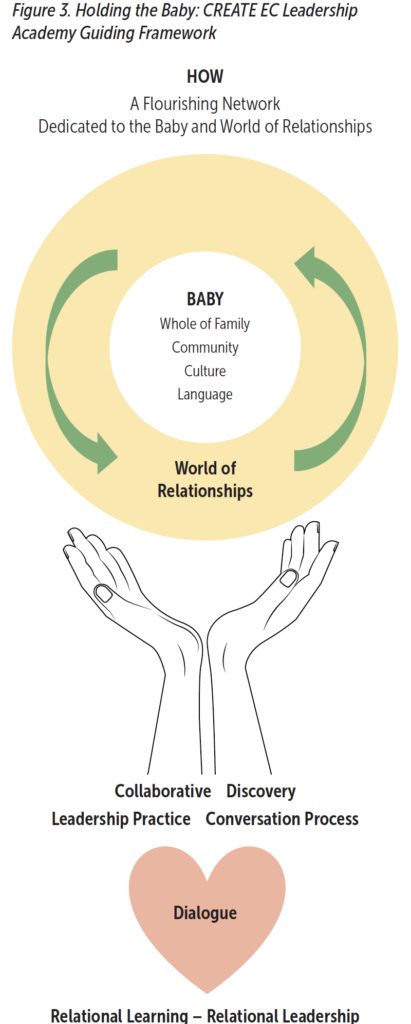
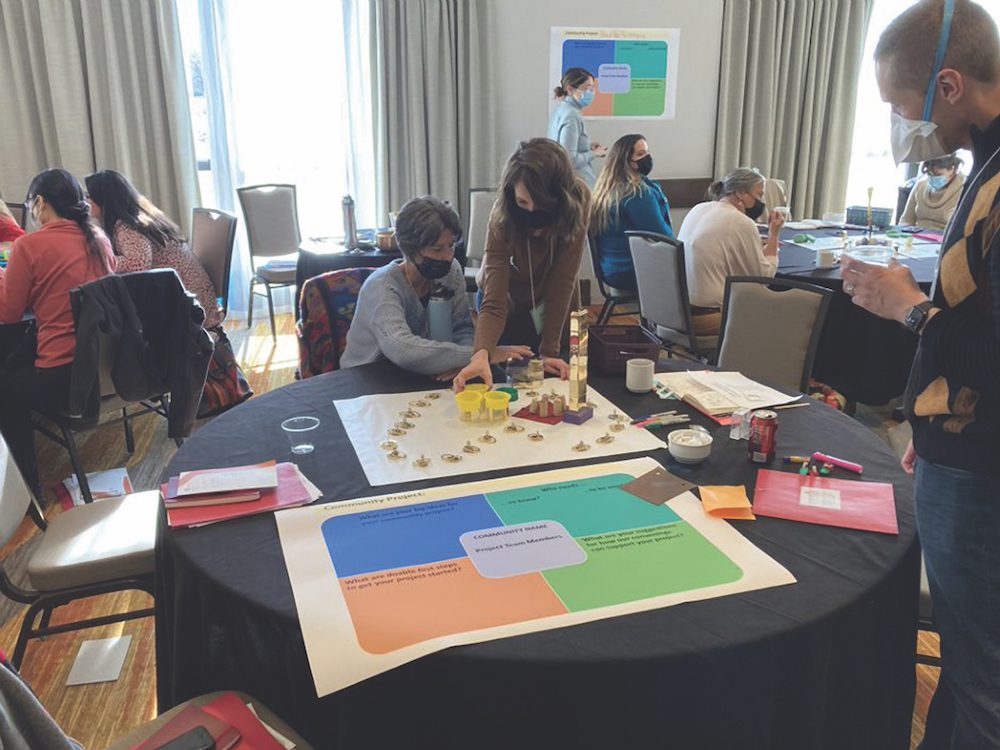
Bridging Academic Preparation with Needs in the Field
Monthly virtual meetings offered time for community partners, faculty members, and FDP staff to share presentations about their community and expertise as essential planning to build on these strengths. At the December 2021 in-person retreat, we explored what early childhood professionals need in order to offer high-quality early education to young children and their families. Using an on-the-wall planning process, CREATE EC members were invited to offer their ideas and recommendations about key priorities for early education and care. Time was given for conversation and cross-learning as participants moved around the room, focusing on New Mexico’s professional needs for early childhood quality through actual practice on the ground. These conversations began to shape individual community projects where community teams were joined by faculty and FDP through new relationships that were beginning to form.
Co-Designing Community Projects
The community project teams met to learn about the community as essential grounding that could guide all of CREATE EC’s work over the 2 years. Using FDP’s open-ended materials, they co-constructed a vision statement and defined the goal for six community projects that would support culturally understood needs for early childhood workforce development. Six community projects were developed through the 2-Year Leadership Academy which included: (1) a culturally responsive activity book put together by youth artisans from the Eight Northern Pueblos, (2) wellness hubs across the Gadsden rural area in support of practitioners who travel long distances to family homes, (3) community conversations on racism led by the Hobbs team, (4) reflective practice for leadership development of a new county-wide coalition launched in Las Vegas, (5) early childhood network celebration of professionals for renewal of the Paso a Paso Network in Taos, and (6) authentic dialogue with early childhood educators to support their social–emotional well-being to develop a partnership for professional retention and recruitment led by a team from Farmington. See Figure 4 for two examples of the vision and goal construction from our community authors Krystal Chavarria-Gonzàlez and RJ Martinez. Their stories illustrate the creativity and unique solutions imagined to address real-life issues faced professionally in each community.
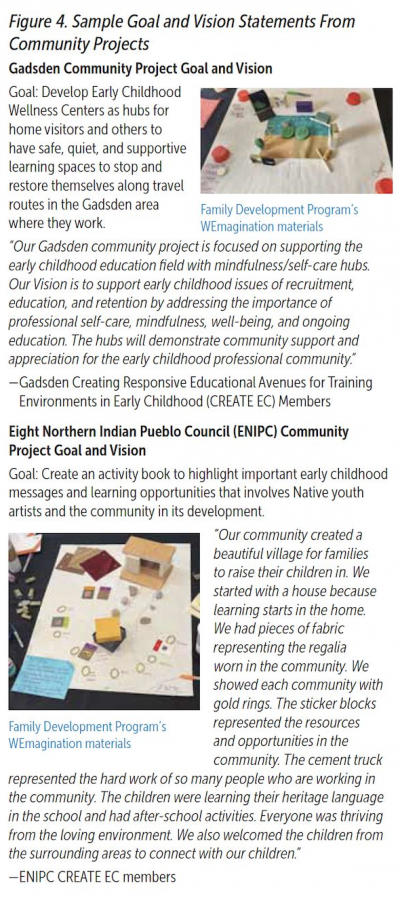
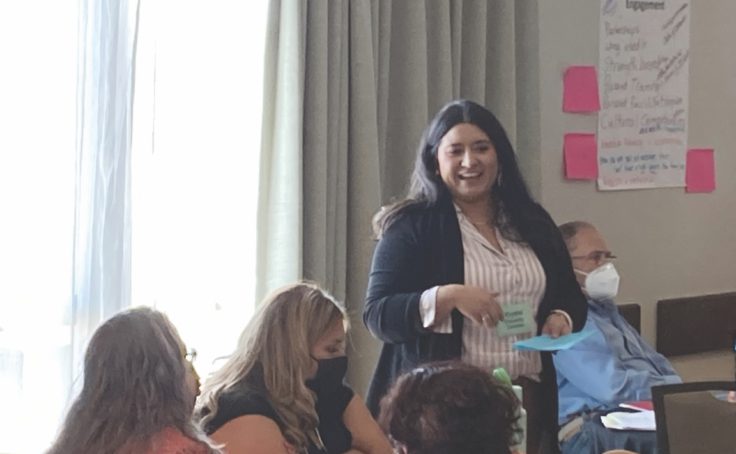
Collaborating for Curricula Development
At our Year 1 May 2022 retreat, we formed curriculum cluster teams based on early childhood professional development needs identified through discovery conversations. The focus of Year 2 had faculty take the lead to create new course content and online professional development with active participation of community partners and FDP. Five curricular cluster teams worked collaboratively to address educator practice, moving beyond theory to understand pragmatic applications. Each Academic Cluster developed 2-4 professional development online modules offered through the COEHS Institute for Professional Development. Our new professional development series was launched in summer 2023 with scholarships for community partners. The modules and full courses address the following five topics: (1) Social-Emotional Learning, (2) Equity, (3) Literacy and Language Development, (4) Early Identification and Early Intervention, and (5) Early Childhood Collaborative Leadership. The courses will be integrated into COEHS academic programs and eventually be connected as a crossdisciplinary distributed minor after completing the required academic review.
Lessons Learned
A relational Leadership Academy for authentic collaboration required making time to hear each other’s stories and to reflect on sensitive issues of diversity and equity that captured strengths of New Mexico that also intentionally built on strengths of all partners.
Relationships as the Heart of Collaboration
The future success of any community depends on its ability to foster the well-being of its children. New Mexico is a minority majority state and represents one of the most diverse states in the nation. Our diversity brings a richness to the people, but it also comes with challenges. The community coalitions that were part of CREATE EC are fully aware of these challenges and have worked tirelessly to create positive outcomes for the families and children in their communities.
Before the start of the CREATE EC initiative, FDP reached out to six early childhood coalitions across all regions of New Mexico to inform them about the initiative and garner their interest. These preliminary discussions showed a culturally responsive approach toward the diversity of our state and allowed time for the coalitions’ leadership to meet with their respective groups and share this opportunity with them. Because of these steps it created a safe place and signaled that community respect would guide the process.
At CREATE EC’s first kickoff meeting in August 2021, a robust dialogue into the well-being of New Mexico’s children began. The Leadership Academy’s community partners represented early childhood professionals from tribal nations, rural and Spanish-speaking communities, small towns, and coalition members who were African American as an important underrepresented cultural group in our state. Coalition members openly shared concerns about issues such as substance use, unemployment, lack of basic services, strained health and education systems, the hardships of grandparents and kin raising children, the need for quality early childhood care and education, and lack of parenting classes. They also shared stories about the beauty in family and extended family supports, emphasizing the many strengths of families in their community who take good care of their children and are resilient.
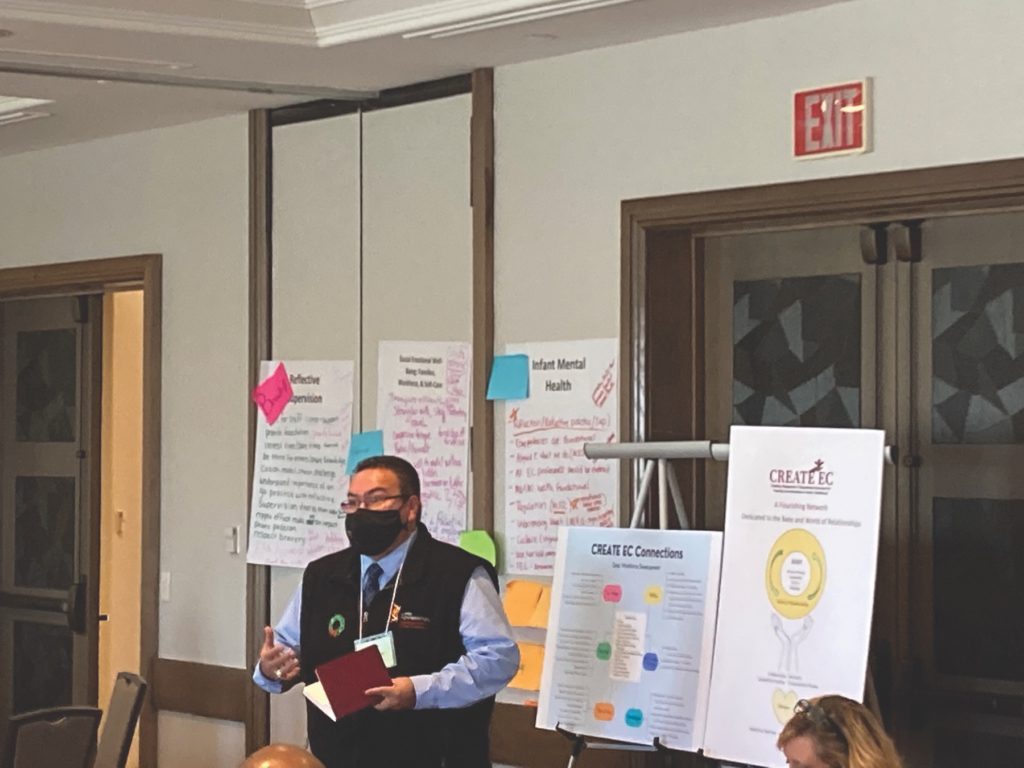
RJ is the coordinator for one of the coalitions that participated in CREATE EC. This coalition had started in 2017 and was led by the LANL Foundation and Eight Northern Indian Pueblo Council. Through this partnership the Tribal Outreach Program was established to conduct research for a community assessment to identify early childhood and family support resources available to the eight northern Pueblos of Nambe, Ohkay Owingeh, Picuris, Pojoaque, San Ildefonso, Santa Clara, Taos, and Tesuque. This coalition comprised of representatives from each of the eight Pueblos was formed to offer guidance and support to ensure cultural integrity. Because of the unique partnership between the LANL Foundation and Eight Northern Indian Pueblo Council, CREATE EC engaged two advisors who were selected from both organizations along with two coalition members. Bringing tribal voice as well as underrepresented communities to be part of CREATE EC created an essential sense of inclusivity.
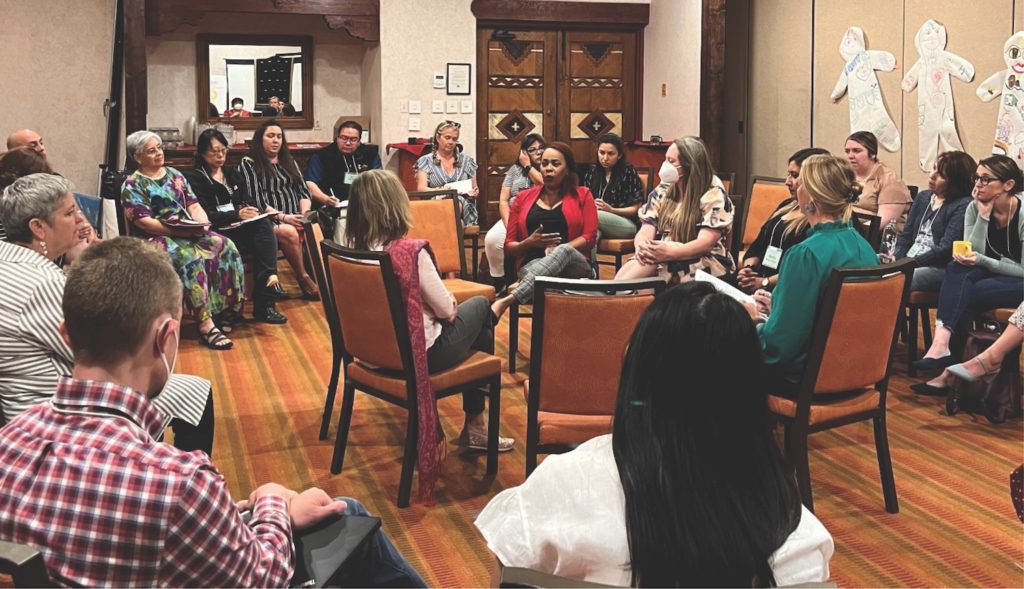
Making a Commitment to Truly Change Outcomes
New Mexico has many committed local early coalitions and leaders who are doing remarkable work in their communities. CREATE EC recognized the importance of reflecting on the community’s journey first before beginning to dig deeper. All community partners had a shared goal for their communities and demonstrated that they had the skill and confidence needed to be self-sufficient, lifelong learners who will continue to thrive. All of them already had a strong foundation in early childhood development. But in order to see the true generational change, it was important for them to know that they were not alone and that we—the big WE—are all in this together. Empowering those who are in the field, engaging with families as essential partners, and investing in the community were essential steps in ensuring continued success for all coalitions. Bringing communities together and understanding that the work being done in service of families and children was vital to provide new perspectives and an informed approach. In the end, community partners recognized as early childhood leaders that, “It is not about you, it is not about us, it is about the children.” Their strong commitment focused the Leadership Academy as a whole on working together to provide high-quality early childhood education and early care to underserved communities in New Mexico.
Collective Reflection to Strengthen Shared Learning
Monthly virtual sessions began with time to reflect on a question about relational leadership that was sparked by a quote, a poem, or a big idea. Time was made to explore these offerings through small breakout group conversations that set up a monthly rhythm of “relational moments” that always welcomed coming together. Each time the Leadership Academy members met, they closed the convening with “Appreciations” where they took time to practice gratitude as an important way of being with one another, moving past the impulse to “do, do, do” that characterizes so much of daily life. The Leadership Academy’s four in-person retreats integrated time for reflection called “Pause…” with journals provided to all participants. Each of the gatherings closed with a powerful Open Chair Dialogue facilitated for large-group reflection. Two concentric circles of chairs were set up with a large circle on the outside as a Listening Circle and a small circle in the center for dialogue. Two facilitators sitting in the inner circle of nine chairs invited six Leadership Academy members to join them in the center with an open chair left for others to enter as he or she felt moved to do. CREATE EC Network members were invited to move in and out of the dialogue and listening circles as they had things to say. The outer listening circle closed the Open Chair Dialogue by offering insights and larger observations of what was heard and spoken from the heart.
Slowing Down—Pause
The Leadership Academy created a space for all participants to pause and slow down from the busyness of their roles and responsibilities. CREATE EC celebrated, acknowledged, and respected the work of each CREATE EC Network member by fostering a deeper understanding of who they are as human beings and listening to the stories endured throughout New Mexico, especially during the pandemic. For the first retreat in December 2021 each person was asked to bring a small object of introduction that was symbolically honored on a centering-piece in the middle of the room. These small objects were a representation of who the participants are and where they are from. The Leadership Academy members had the opportunity to build trust with one another and open the opportunities for new understanding in work lives, whether in community or the university. The discussions generated a safe space of vulnerability and honesty of the realities that they endured personally and professionally. Participants reflected and acknowledged that although they faced challenges and barriers, they developed a sense of optimism and hope for the vision of gratitude that the families and children in their communities and throughout New Mexico deserved.
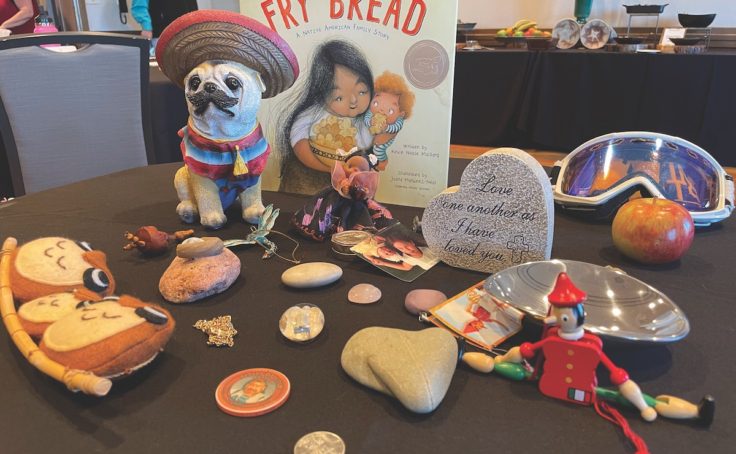
Deep Listening and Reflection as Essential Relational Practice
Throughout the 2 years, a commitment to intentional reflection strengthened the learning community’s relationships through making space for deep listening as essential practice for nurturing trust. Even with the push to get things done, time was consistently made to attend to relationships as a source for welcome, invitation, and the fundamental reason for why and how the participants do meaningful work together. The Leadership Academy became an authentic learning community because of its steadfast relational practice that valued being with one another and listening deeply to all that was being shared. To capture the heart of what deep listening requires, in Box 1, Krystal Chavarria-Gonzàlez shares the story of the Gadsden Early Childhood Coalition.
Box 1. Storytelling to Understand Community Strengths
The Gadsden Early Childhood Coalition’s collective efforts illustrate the powerful learning that all six community partners brought to Creating Responsive Educational Avenues for Training Environments in Early Childhood (CREATE EC) as the group made time to hear community stories as a central foundation for their work together. Krystal Chavarria-Gonzàlez describes the importance of building on a community’s traditional strengths that was valued by all CREATE EC Network members.
Individual professionals from our Gadsden community have worked hard to make a difference in our world of early childhood. In the midst of the COVID-19, despite the resource scarcities, barriers, and challenges that we faced every day in the work, we all were working tirelessly to ensure the children and our communities were surviving. The Gadsden coalition unleashed their creativity by developing activity boxes; hosting drive-through educational events; dropping off basic necessities such as diapers, wipes, clothes, formula, canned food, car seats, and books. Rural communities throughout Gadsden depended on their home visitors, early intervention therapists, teachers, child care providers, promotoras (community health workers), and other early childhood professionals more than ever. We discovered the opportunity to collaborate and work together as early childhood professionals regardless of the organizations we represented. As a result, the underlying competition of the early childhood programs slowly faded away and we joined together to support the basic needs of the children and families in our communities. We created a network of early childhood professionals and developed trust, respect, and open communication to best serve the families throughout our rural area. We recently have joined forces through a memorandum of understanding to become a chapter of the Doña Ana Early Childhood Education Coalition, expanding the reach and effectiveness of both of our earlier collective efforts to better serve families throughout Doña Ana County.
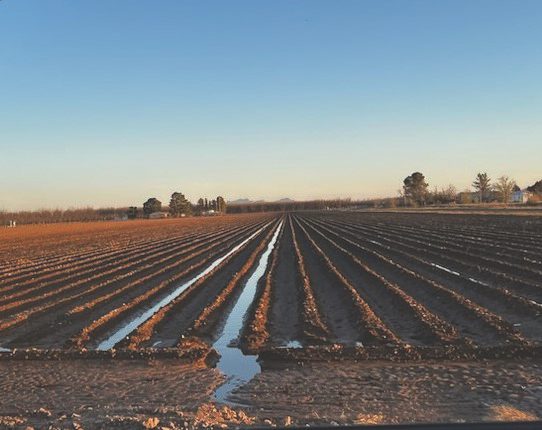
Rural fields, irrigation, pecan orchard, distant homes, and mountains of Gadsden area. Photo: Krystal Chavarria-González
All of our CREATE EC coalitions know the history of our communities and the people living in our communities. We want our people to feel valued and honored for all that they have done. We have listened to the stories of our great-grandparents, grandparents, and generations before them of their resilience, advocacy, culture, religion, and beliefs. The diversity of the people in their respective communities is unique and foundational to contributions they make to their individual early childhood organizations. We know a lot of our communities are underrepresented and are underprivileged for maintaining their basic needs. These communities and their families’ voices need to be heard.
Our communities are created of fields of agricultural, Native American reservations, flat lands, lakes, and rivers while being surrounded by mountains from the north to south and east and west of New Mexico. Our diverse languages and dialects are our foundation of how we communicate to one another. We recognized that our individual organizations and communities around New Mexico have been working in silos. CREATE EC created a safe, devoted, and vulnerable space of early childhood professionals who are dedicated to making an impactful and sustainable change in the world of early childhood. We are caring and compassionate people who truly want to make a difference in our communities as well as in our beautiful state of New Mexico.
Whart Can CREATE EC Mean for the Future?
CREATE EC holds transformative potential because it deliberately connected community experience and workforce needs with new ways that COEHS co-creates academic and professional development coursework. While growing early education from the ground up takes time, it was recognized as adding value by every member of the Leadership Academy. New partnerships can now be sustained because trust through relational practice became the foundation of collaborative and highly creative work together.
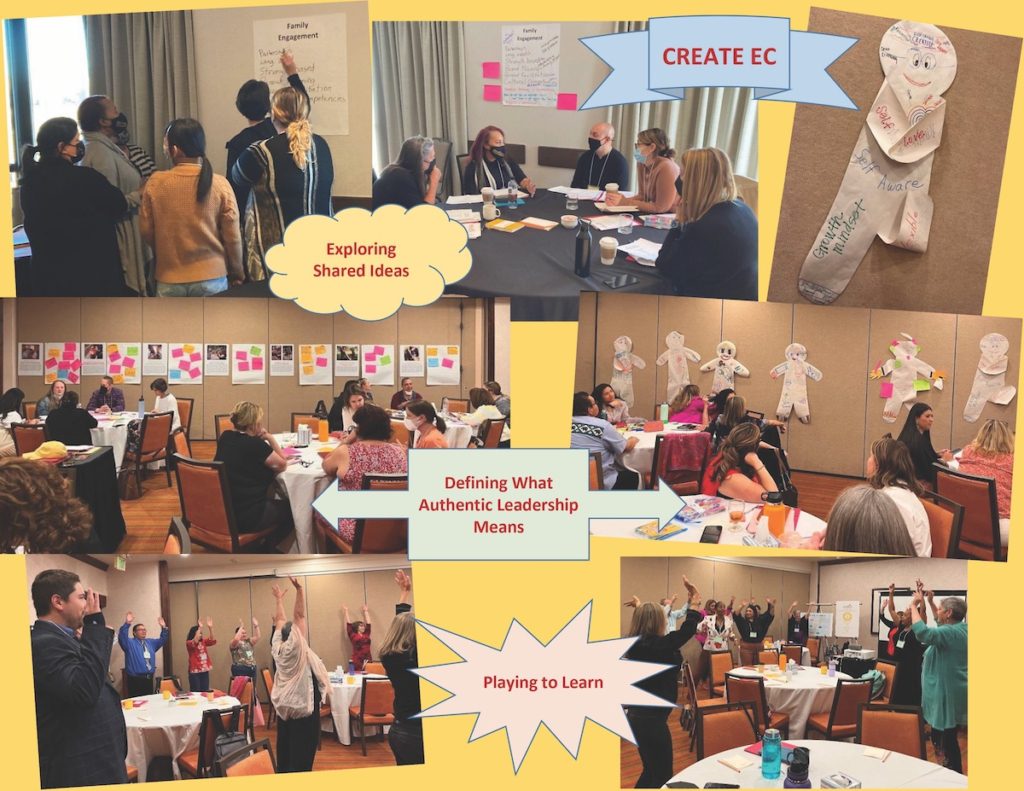
Strengthening Relational Leadership and Collaborative Practice
This initiative has the distinction of being one of a kind as it is a Leadership Academy focused on early childhood that integrated relational leadership to strengthen collaborative practice through creative, playful engagement (see CREATE EC Collage). The Academy generated opportunities for participants to build skills and to strengthen their own professional development. The members of CREATE EC developed strong bonds and a network of resources that they could call on and share with their respective communities as well as within COEHS programs. The FDP department also provided Leadership Academy members with an Early Childhood Leadership Toolkit as a self-guided resource that strengthens collaboration for continued partnership. All these efforts gave the Leadership Academy members the ability to be innovative in their approach to addressing the challenges our state is facing. While concerns for child and family well-being may differ from county to county, one thing remains constant. We want to see transformational and generational change for the betterment of young children. This is where the coalitions are aligned, and with opportunities through gatherings like this, de-siloing and refocusing can begin.
Achieving Outcomes Together
There have been many positive outcomes that have come out of the CREATE EC initiative. One has been the growth in professional development in the members where many have transitioned into leadership positions in their organizations. Another outcome has been that several of the coalitions successfully obtained new funding by the state. The Local Early Childhood Systems Building Grant was designed for local community coalitions to achieve necessary systems change by building local capacity for achieving the goals and objectives of the New Mexico Early Education and Care Department’s (ECECD) Strategic Plan. When the state grant was announced, FDP staff reached out to all statewide coalitions in New Mexico to encourage them to apply. It is worth noting that FDP continues to support a large group of community-based early childhood coalitions in partnership with ECECD to strengthen local to state governance for early childhood systems change.
The work of CREATE EC has helped to create bridges of growth between the coalitions and has begun to strengthen a strong foundation for sustainability. It also has supported new relationships and collaboration between community members, FDP, and faculty. It is our hope that this alignment of early childhood efforts in our state will strengthen early childhood resources and connections within communities; connect families to wide-ranging supports, resources, and opportunities; and lead to thriving communities.
Combining Community and University Expertise
New Mexico has unique challenges to achieve equity for all young children, families, and communities across a large, culturally diverse, and mostly rural state that faces serious impacts of poverty. Ensuring culturally informed, culturally responsive, and high-quality professional development calls for new approaches for educational excellence that can meet a wide range of early education needs. CREATE EC’s Leadership Academy, as a dynamic approach of collaborative learning and relational leadership, creatively combined the strengths of community professionals, faculty, and FDP staff to find new solutions to meet state early childhood workforce needs. The initiative has demonstrated the power of growing professional opportunities directly with community practitioners to shape relevant training and course development that is meaningful on the ground. This partnership is bringing new levels of transformative innovation to the University of New Mexico’s COEHS. In closing, COEHS interim dean Kristopher Goodrich, CREATE EC lead PI, stated:
Many colleges of education, ours included, can be at times too focused around K-12 education, and neglect the important formative years from birth to age 5 that set the foundation for learning and development. We hope that projects, such as CREATE EC, can support our College in better attending to the often overlooked need to support early learning, and augment and strengthen the early childhood focus of our work, alongside support for education transitions for our students and their families. In that way, we hope not only to transform the early childhood workforce in the State of New Mexico, but also to transform ourselves as educators and as a College-as-a-whole.
Acknowledgments
This CREATE EC Initiative was supported by a 2-year grant from the W. K. Kellogg Foundation awarded to the College of Education and Human Sciences of the University of New Mexico.
Lois Vermilya, MA, is Creating Responsive Educational Avenues for Training Environments in Early Childhood (CREATE EC) co-principal investigator and Leadership Academy co-facilitator and is director of the University of New Mexico’s Family Development Program (FDP) in the College of Education and Human Sciences. Ms. Vermilya was named a ZERO TO THREE Leader for the 21st Century Fellow and is a member of the Leadership Fellows Academy. She has a master’s degree from the University of New Mexico in symbolic anthropology and has been a nonprofit executive for 45 years working in partnership with tribes and diverse communities both in the US and Latin America. Ms. Vermilya has been director of FDP for 20 years. Her hope for New Mexico’s youngest children and their families is that they feel surrounded by all New Mexicans with steadfast beliefs in their abilities and cultural strengths. “I want New Mexico to have children as the center of our civic agenda.”
Richard Julian (RJ) Martinez III, MPA, is the Los Alamos National Laboratory (LANL) early childhood program manager. Mr. Martinez is an enrolled member of the Pueblo of Santa Clara and is currently serving his 4th 1-year term as a Tribal Councilman. Santa Clara Pueblo is one of 23 tribes in New Mexico. Mr. Martinez is an alum of the W.K. Kellogg Leadership fellowship as a part of Class II, that comprised 80 community leaders throughout the United States. He received a bachelor’s degree in sociology from Fort Lewis College and a master’s in public administration from Grand Canyon University. Mr. Martinez has also been part of the Tribal Data Champion Fellowship, Class III, a program through the University of New Mexico Center for Participatory Research. His hopes and dreams are to ensure all children and families have equitable access to resources to thrive in life in order to see transformational and generational change, “We are a melting pot of diversity. The communities I represent have multiple cultures, each with a rich history that needs to be understood in order to build upon it and grow a strong and sustainable foundation.”
Krystal Chavarria-Gonzàlez, was Aprendamos Intervention Team’s program director and recently stepped into an early intervention specialist/evaluator role to make more time to care for her newborn daughter. Ms. Chavarria-Gonzàlez has a bachelor’s of science degree in early childhood education with two endorsements that include Teaching English to Speakers of Other Languages (TESOL) and Bilingual Education. She has been employed with Aprendamos Intervention Team for the past 17 years. While at Aprendamos, Ms. Chavarria- Gonzàlez has held many positions beginning as a file clerk, developmental instructionist (DI), family service coordinator (FSC), lead FSC/DI, community education coordinator, child care liaison, and program director. She is a member of the ZERO TO THREE community, a board member for the Children’s Reading Alliance, a candidate for Infant Mental Health endorsement, a member of the Doña Ana County Early Childhood Coalition, and a member of the Gadsden Chapter of the Doña Ana Early Childhood Coalition. Ms. Chavarria- Gonzàlez’s hopes and dreams for young children is that we provide a foundational nurturing, safe, and educated community for them to thrive and be successful in creating their hopes and dreams. “My community is a rural, farming, and multigenerational community. We have a beautiful community of people that provide the great agricultural fields of cotton, alfalfa, chile, pecans, and onions.”
Cathy Huaqing Qi, PhD, is a professor in the Department of Special Education at the University of New Mexico. She currently is serving as interim department chair of Special Education. Dr. Qi has conducted research funded by the National Institutes of Health examining children’s language and behavioral developments in Head Start in New Mexico for many years. Dr. Qi was selected as an American Speech- Language-Hearing Association (ASHA) Diversity Champion for 2009 for her contributions to the research in communication disorders with children from culturally and linguistically diverse backgrounds. Dr. Qi has also served on the Policy Council and Health Committee of the Youth Development Incorporated Head Start/Early Head Start in Albuquerque, New Mexico. Her hopes and dreams for New Mexico young children are that they receive high-quality early childhood education in a nurturing and supportive environment.
Learn More
University of New Mexico College of Education and Human Sciences website: https://coehs.unm.edu
University of New Mexico College of Education and Human Sciences Institute for Professional Development website for CREATE EC Professional Development Online Offerings: https://ipd.unm.edu/index.html
Center for Relational Learning & Relational Leadership website: https://relationalearning.com
University of New Mexico Family Development Program website: https://fdp.unm.edu
Connecting School, Family, and Community: The Power of Positive Relationships. G. Otero (2016) Centre for Strategic Education, Seminar Series 256
Partnering for School Success Begins at Birth: Early Childhood Leadership. Tool Kit F. Varela & L. Vermilya (2021), University of New Mexico, College of Education and Human Sciences, Family Development Program
Florecer: Strategic Plan 2022-2027. Growing Up New Secretary Elizabeth Groginsky and staff (2021), New Mexico Early Education and Care Department
Pritzker Prenatal-to-Three Guiding Principles for Equity (2021).
Growing Up New Mexico, PN-3 Statewide Steering Committee
Suggested Citation
Vermilya, L., Martinez III, R., Chavarria-Gonzàlez, K., & Huaqing Qi, C. (2023). Creating Responsive Educational Avenues for Training Environments in Early Childhood (CREATE EC). ZERO TO THREE Journal, 43(4), 27-36.

